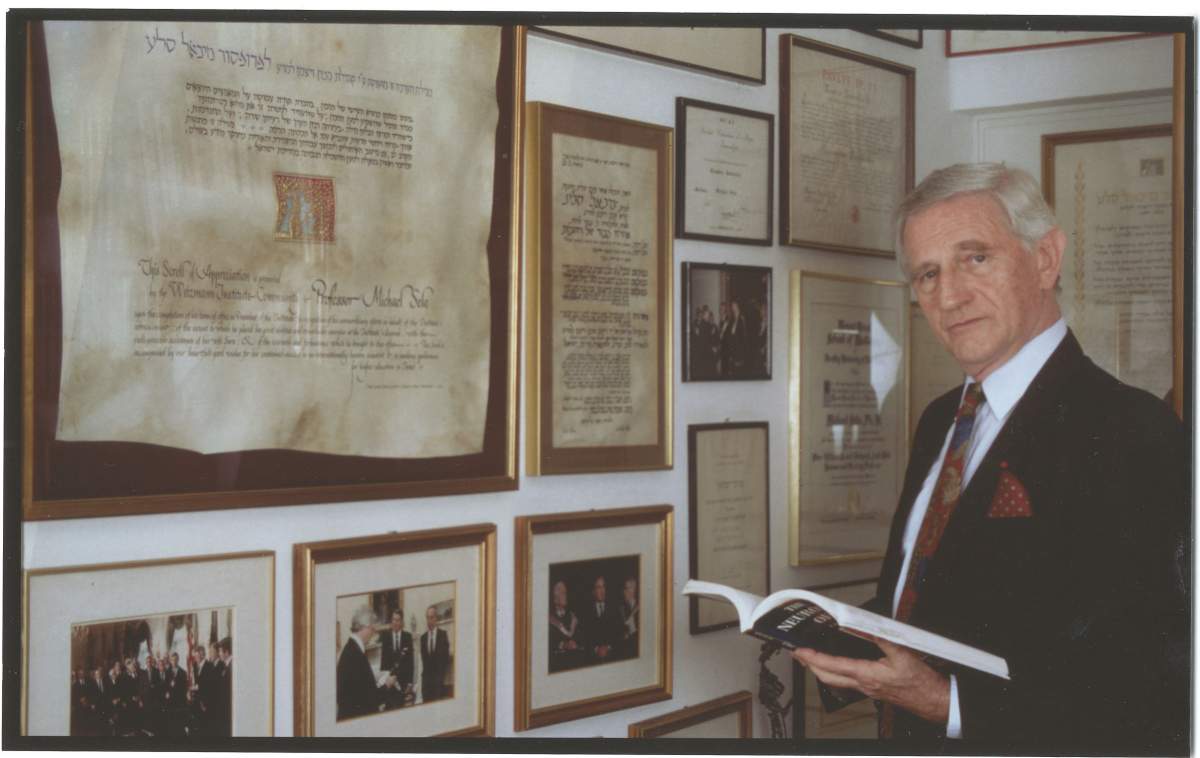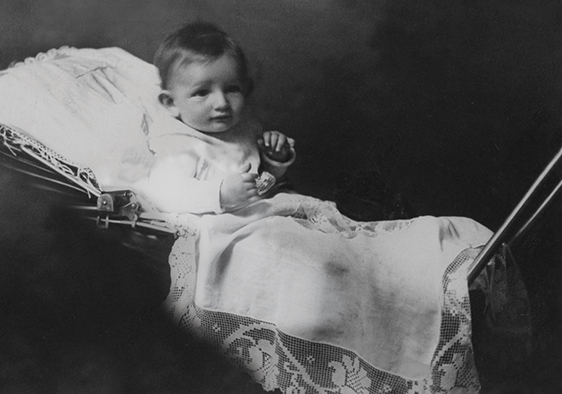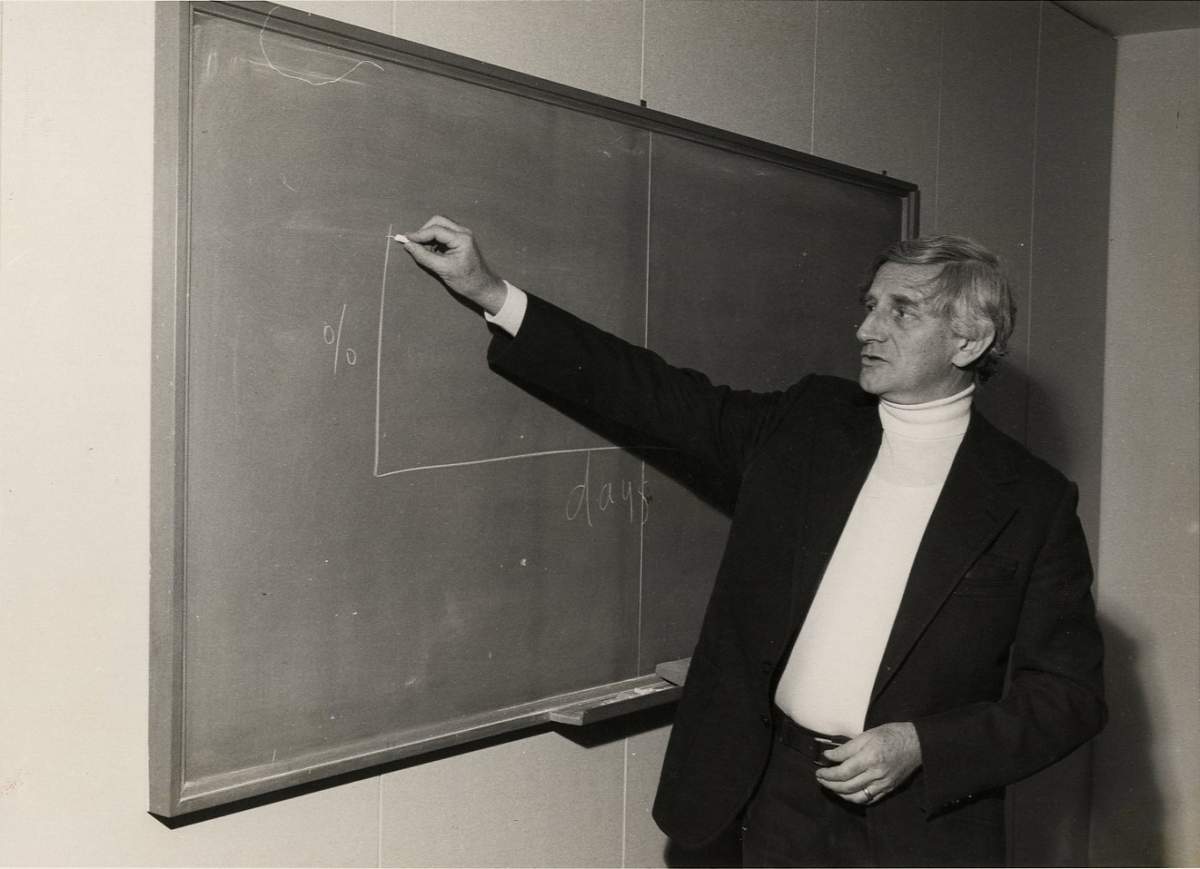Are you a journalist? Please sign up here for our press releases
Subscribe to our monthly newsletter:
Institute Professor Michael Sela, a renowned immunologist who served as the sixth president of the Weizmann Institute of Science, passed away on May 27, 2022. He was 98.

Sela co-invented and held patents on two blockbuster drugs: Copaxone® for the treatment of multiple sclerosis and Erbitux® for treating cancer. But he was most proud of his part in research that did not directly cure disease or result in patents. These were studies that helped elucidate the genetic control of the immune response, leading to the development of new fields in immunology. He was particularly recognized in the scientific world for his research on synthetic antigens, molecules that provoke an immune response.
Weizmann Institute of Science President Prof. Alon Chen said in his memory: “Throughout his illustrious career, Prof. Sela made numerous discoveries that forever changed the face of immunological research worldwide. But his impact was felt well beyond his research bench. He was a leader and a role model for multiple generations of students and scientists on campus, and he undertook a long series of leadership roles. His legacy will live on for years to come, and we can all take inspiration from his extraordinary passion, sharp intellect and vision.”
Born in Poland in 1924, Sela originally thought he would specialize in chemistry. He arrived in Israel at age 17, after his family had first fled Poland and then Romania. In 1941, shortly after his arrival, he enrolled in the chemistry program at the Hebrew University of Jerusalem. After completing his MSc in Jerusalem, he went to Geneva to conduct PhD studies, but several months later he moved to Italy where he helped whisk European Jews – mostly Holocaust survivors – to Israel. When Israel’s independence was declared, he became a commercial secretary in the Israeli legation in Czechoslovakia. His immediate family had escaped to Israel, but many other relatives had perished at the hands of the Nazis.
""His legacy will live on for years to come, and we can all take inspiration from his extraordinary passion, sharp intellect and vision"
Returning to Israel in 1950, he joined the Weizmann Institute of Science and became a student of the acclaimed biophysicist Prof. Ephraim Katzir, who later became president of Israel. Katzir worked with poly-amino acids, synthetic models that facilitate the study of proteins, because they had interesting properties and promised chemical applications, but Sela thought that the same molecules might perform biological functions. Specifically, he suggested that they could serve as antigens. He received his PhD degree in protein chemistry from the Hebrew University for research undertaken at the Weizmann Institute, which at the time did not award degrees of its own. In 1963, he was appointed professor.

The main theme tying together Sela's many years of scientific research was the elucidation of the chemical structure and biological function of biologically relevant macromolecules. His primary interest was in the structure, function and mechanism of action of proteins, and in the understanding of the molecular basis of immunological phenomena and of the genetic control of immune response. He also turned to cancer research, with the idea of creating small molecules that would block the receptors on cancer cells. Apart from Erbitux®, studies he conducted with colleagues provided the basis for the development of two other cancer drugs: Vectibix® and Portrazza®.

Prof. Sela served the Weizmann Institute in various important capacities. In 1963, he founded the Institute's Department of Chemical Immunology and for the next twelve years, served as its first head. From 1970-73, he was dean of the Institute's Faculty of Biology, from 1970-71, the Institute's vice president and from 1975-85, its president. He then served as deputy chairman of the Institute's Board of Governors and was named Institute Professor. Overseas appointments included stints as a visiting scientist or professor at the National Institutes of Health, the Massachusetts Institute of Technology, Harvard University, College de France and the Pasteur Institute. At the Weizmann Institute, he was the incumbent of the W. Garfield Weston Professorial Chair of Immunology. He published more than 800 articles, chapters and books in the fields of immunology, biochemistry and molecular biology.
Within the international scientific community, Sela also achieved prominence. In 1967, he became a foreign member of the Max-Planck Institute for Immunology. From 1970-74, he served as vice chairman and as chairman of the Board of Advisors to the Basel Institute of Immunology. From 1975-79, he was chairman of the Council of the European Molecular Biology Organization. In parallel, between 1978-81, he chaired the Scientific Advisory Committee of the newly-created European Molecular Biology Laboratory in Heidelberg. From 1977-80, he was president of the International Union of Immunological Societies. At the same time (1979-82), he was a member of the Global Advisory Committee on Medical Research of the World Health Organization. From 1989-96, he served as president of the Scientific Council, Institut Pasteur – Weizmann Institute; he then became an honorary president of the Pasteur-Weizmann Council.
In 2000, he was elected a member of the Academic Committee of the Open University of Israel. Academy memberships included the Israel Academy of Sciences and Humanities, the National Academy of Sciences of the United States, the Pontifical Academy of Sciences, the Russian Academy of Sciences, the French Academy of Sciences and the American Philosophical Society.

Sela's numerous prizes and honors included the Israel Prize in the Natural Sciences awarded to him in 1959, when he was 35 years old; the Rothschild Prize in Chemistry (1968); the Otto Warburg Medal awarded by the German Society of Biological Chemistry (1968); the Prize of the Institut de la Vie, France (1984); Jaubert Prize, Switzerland (1986); the Albert Einstein Golden Medal, UNESCO (1995); the Harnack Medal of the Max-Planck-Society (he was the first non-German to receive this award) (1996); and the Baillet Latour Health Prize, Belgium (1997). Sela and colleague Prof. Ruth Arnon were also named the 1998 Wolf Prize Laureates in Medicine. Sela was awarded honorary doctorates from the Universities of Bordeaux, Strasbourg, Mexico, Tufts, Colby College (Maine, USA), the Hebrew University of Jerusalem, Tel Aviv University and Ben-Gurion University of the Negev, and was made an honorary fellow of the Open University of Israel. He was awarded the Commander's Cross of the Order of Merit Award, Germany, and named an Officer of the Order of Legion of Honor, France.

Sela set up the Yeda-Sela Fund, which supports basic research projects that may not otherwise receive backing from traditional funding agencies. Beside scientific research, he was committed to cultural activities. He served for ten years as chairman of the Batsheva Dance Company’s Public Council and was then elected its honorary president for life. For several of the first Arthur Rubinstein International Piano Master Competitions he served as an honorary vice chairman. He was on the Board of the Rimon School of Music and of the Jerusalem Academy of Music and Dance. Sela was also a founding member of the Yitzhak Rabin Center and a member of the Peres Center for Peace and Innovation. In 2002, he became chairman of the United World Colleges’ National Committee for Israel. Scientific symposia were held at the Weizmann Institute on the occasion of his 80th and 90th birthdays. In 2019, the Michael Sela Auditorium was inaugurated at the Institute in his honor.
English was his seventh language after Polish, German, Russian, Romanian, French and Hebrew. After mastering English, he learned Italian and Czech.
Sela is survived by his wife, Sara Sela, and three daughters.